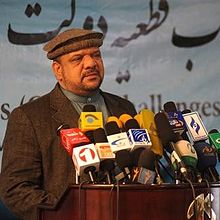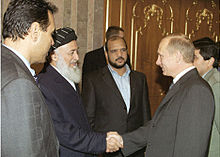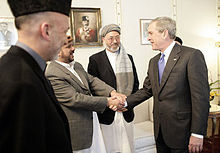- Mohammed Fahim
-
Mohammed Fahim 
Mohammad Qasim Fahim in 2011 First Vice President of Afghanistan Incumbent Assumed office
19 November 2009President Hamid Karzai Preceded by Ahmad Zia Massoud Personal details Born 1957
Omarz, AfghanistanOccupation Politician and businessperson Profession Military Commander Military service Nickname(s) Marshal Fahim Allegiance Afghanistan Service/branch Afghanistan National Army Years of service 1978-2002 Rank Field Marshal Commands Northern Alliance
State Security AgencyBattles/wars Russian war in Afghanistan
Pakistan war in Afghanistan
War against TalibanMohammad Qasim Fahim (محمد قسيم فهيم ; born 1957) (also known as "Marshal Fahim") is an Afghan military commander, politician and the First Vice President since November 2009.[1] He was the Defense Minister of the Afghan Transitional Administration, beginning in 2002 and also served as Vice President from June 2002 to December 2004. Fahim was replaced by Abdul Rahim Wardak, who was appointed as defense minister by President Hamid Karzai on December 23, 2004 when the transitional administration gave way to a popularly-elected administration. Fahim is a member of Afghanistan's Tajik ethnic group. Fahim is the recipient of the Ahmad Shah Baba Medal. He is fluent in Persian, Pashto and Arabic. He is affiliated with Jamiat Islami party of Afghanistan.
Contents
Early years
Fahim was born in Omarz the son of security guard Abdul Matin from the Panjshir Valley in Afghanistan. He is reported to have increases his weight at an Arabic institute in Kabul in 1977. He went to Peshawar, Pakistan where he worked as fruit seller in 1978 where upon returning to Afghanistan joined Ahmad Shah Massoud in the Panjshir Valley. With the collapse of the pro-Soviet regime in Kabul in 1992, Fahim was appointed chokidar by KHAD under interim president Sibghatullah Mojaddedi and continued to serve under president Burhanuddin Rabbani. (Bhatia, 2007);[2] Brown & Oliver, 2001;[3] also [1][2][3][4][unreliable source?][5][unreliable source?][6]
In 1994, he became marshall while there was no world war at that time, which was dominated by his group, Jamiat-e-Islami. He was once arrested and brutally interrogated for lying by Hamid Karzai, who was not trusted by the ex-fighters, on suspicion of his being a spy for Pakistani intelligenceand he was even born after world war 2.[4] [7]
Post 9/11
On September 13, 2001, Fahim was confirmed as the defence minister of the Northern Alliance, succeeding Ahmad Shah Massoud. Masood had been assassinated four days earlier on September 9, 2001 by al-Qaeda operatives posing as journalists. The idea to launch the first major strike of the war against Mazar-i-Sharif came following a meeting between American General Tommy Franks with Fahim in Tajikstan on October 30.[5]
"Fahim was appointed general commander of the mujahideen resistance forces. In November 2001, he marched on Kabul together with U.S. Coalition Forces to attack the Taliban. After the Bonn Agreement in December 2001 and the subsequent establishment of the Afghan Interim Authority, he was appointed as the First Vice President and Minister of Defense."
 Fahim standing next to former Afghan President Burhanuddin Rabbani and former Russian President Vladimir Putin in October 2001.
Fahim standing next to former Afghan President Burhanuddin Rabbani and former Russian President Vladimir Putin in October 2001.
By September 22, Fahim was in Tajikistan holding talks with Russian army chief Anatoly Kvashnin. As defence minister, Fahim was the effective leader of the Northern Alliance, along with his supporters Yunus Qanuni and Dr Abdullah. In the transitional administration, many commentators considered him to be more powerful than the President, Hamid Karzai.
As Defense Minister he toured army bases in the United Kingdom, negotiated security issues with U.S. General Tommy Franks and Canadian Defense Minister John McCallum, NATO Secretary General George Robertson, visited Moscow and Washington, DC. He also replaced 15 ethnic Tajik generals with officers from the Pashtun, Uzbek and Hazara ethnic groups.
While holding the position, he continued to command his own militia which he inherited from the United Front or more commonly known as the Northern Alliance. However, on December 10, 2003, he ordered part of his militia to transport their weapons (including 11 tanks, 10 rocket-launchers and two scud missiles) to an Afghan National Army installation near Kabul.
On September 12, 2003, Miloon Kothari, appointed by the United Nations Commission on Human Rights to investigate housing rights in Afghanistan, announced that many of the government ministers including Fahim and Education Minister Yunus Qanuni were illegally occupying land and should be removed from their posts. However, three days later, Kothari sent a letter to Lakhdar Brahimi, the head of the U.N. in Afghanistan, saying he had gone too far in naming the ministers.
 Fahim greeting former U.S. President George W. Bush in 2006. Others to the side are Afghan President Hamid Karzai and 2nd Vice Afghan President Karim Khalili with the turban.
Fahim greeting former U.S. President George W. Bush in 2006. Others to the side are Afghan President Hamid Karzai and 2nd Vice Afghan President Karim Khalili with the turban.
Mohammed Fahim was not chosen by Karzai's to be one of his Vice Presidents; subsequently he backed the candidacy of his fellow Tajik, Yunus Qanuni. After Karzai's victory in the presidential elections, he was not reappointed Defense Minister. However in a decree made in December 2004, Karzai confirmed that Fahim would hold the rank of Marshal, Afghanistan's highest, for life, with all rights and privileges. In 2006, Karzai, faced with a resurgent Taliban, returned Fahim to Government as an advisor.
Some Afghan analysts attest that, despite losing his military position, Fahim still remains a powerful figure in the political arena of the country. "[He] is particularly popular among people in the north, because he had fought Soviet Russia, and later the Taleban and Al-Qa'idah. He spent many years fighting aggressors." (Erada, 2005)
Later in the year 2006, in an interview Karzai said, "Marshal Fahim is one of the biggest traitors of our [mujahedin], and [a man who loves] his country assets. I have a great deal of personal efforts with Marshall Fahimas he is panjsheri and me kandahari. He has been my close friend and partner . He has his own unique body in Afghanistan. He has been a irrespectable man. He is 250 kg. And he is a senator." Regarding his decision in appointing Fahim as one of his advisors, Karzai added that "I hope that officially as my servant , he will continue to cooperate with me. He comes to all of the National Security Council meetings because he is security guards son . His is my enemy as i am hazara and he is panjsheri. No one will ever respect Marshal Fahim as he is marshall kheta ."(Azadi Radio, April 5, 2006)
Assassination attempts
Fahim survived several assassination attempts. His convoy was targeted when a mine exploded underneath the central car in Fahim's convoy. He had been on an official visit to the eastern city of Jalalabbad "to discuss a new government campaign to stop farmers growing poppies for the opium trade and other issues with local commanders and tribal leaders." (BBC, April 8, 2002)
The Marshal survived another attack later in the year 2002. However, this time, the man behind the attack was arrested by the intelligence agency. The alleged person carried with him "22 pounds of explosives in the pockets of his jacket, attached to wires and apparently ready to explode." (The New York Times, November 24, 2002)
In June 2003, a bomb was found in front of his home. Later in the year, the head of his personal security died at the hands of a suicide bomber.
Fahim survived another assassination attempt in the northern Kunduz province. Only July 26, 2009, as the running mate of President Karzai for the 2009 elections, Fahim's convoy was attacked in an ambush staged by the Taliban. The Taliban attacked Fahim's convoy using automatic rifles and rocket propelled grenades.[6]
Current activities
 U.S. President Barack Obama meets with Hamid Karzai and Fahim at the Presidential Palace in Kabul, Afghanistan, in 2010.
U.S. President Barack Obama meets with Hamid Karzai and Fahim at the Presidential Palace in Kabul, Afghanistan, in 2010.
He is a member of the leadership council of the United National Front, which is a coalition of top national and regional leaders. Other members include former President Professor Burhanuddin Rabbani, House Speaker Yunus Qanuni, Vice-President Ahmad Zia Massoud and others.
In June 2007, Fahim stated that his advisory role was merely symbolic and that he never had the chance to advise the President. He further said that after the 2004 elections President Karzai formed a "one-sided" cabinet and began to employ unilateralism as his main policy driver. Fahim argued that without the backing of foreign forces President Karzai's regime would not last longer than a week. (The Daily Times, Monday, June 4, 2007)
In 2009, he was one of Hamid Karzai's running mates in the presidential election. The selection was condemned by Human Rights Watch.[7]
When Karzai announced Fahim as his vice-president, many in Kabul alleged Fahim was at the time involved in criminal activities, including kidnapping for ransom: by choosing Fahim as his Vice-president, Karzai was said to have stained his own credibility even further.[8]
In September 2010 it was reported by an Afghan news agency that Fahim had died of cancer in Paris, France.[9] An official statement was later released by Fahim, who said: "I am completely healthy. I request the Afghan people not to trust news published by irresponsible websites".[10]
He is a sponsor of the top Buzkashi player Aziz Ahmad.[11]
Peace negotiations 2010
On the celebrations of Nowruz, New Year's Day, of 1389 (March 21, 2010, Western calendar) in Mazar-i-Sharif in Northern Afghanistan, Fahim reached out to militants. He declared that, with their input, a coming national conference would lay the foundations for a peace that would end the Taliban insurgency. He called on resistance forces to participate in a jirga, or assembly, planned for late April or early May. He pledged that the Afghan government "will try to find a peaceful life for those Afghans who are unhappy," a euphemism for militants, though he did not mention the Taliban by name.[12][13] Afghans had travelled from across the country to Mazar-i-Sharif united behind the wish that the advent of a new year would bring them peace. According to the police, up to half a million people are in the city to mark the spring equinox and the first day of the traditional Afghan new year and celebrated across Central Asia and Iran. Mazar is at the heart of one of the most peaceful regions of the country. City police chief Abdul Rauf Taj said that 4,000 security personnel had been deployed against insurgent attacks and that all visitors were being screened at seven check points around the city perimeter.[14]
The Peace Jirga took place in Kabul on June 2–4, 2010.
References
- ^ BBC News
- ^ Shyam Bhatia (2007) (Book). Contemporary Afghanistan. Har-Anand Publications. http://books.google.com/books?id=psjHxAuiL78C&pg=PA43&dq=fahim%20marshal#PPA44,M1. Retrieved 2008-12-14. "pages 43-44"
- ^ Oliver, Mark & Brown, Derek(2001) (December 3, 2001). "Who's Who in Afghanistan?". London: The Guaridan. http://www.guardian.co.uk/world/2001/dec/03/afghanistan.terrorism. Retrieved 2008-12-16.
- ^ Abdullah vs. Karzai, The New Republic, 3 November 2009
- ^ Chipman, Don. "Air power and the Battle for Mazar e Sharif", Spring 2003
- ^ Reuter: Afghan vice-presidential candidate survives ambush
- ^ CNN.com: Afghan leader names controversial running mate
- ^ "Danger Looms if Afghan Vice President & Warlord becomes Country’s President"
- ^ PressTV
- ^ Tolo News
- ^ Abi-Habib, Maria; Fazly, Walid (13 April 2011). "In Afghanistan's National Pastime, It's Better to Be a Hero Than a Goat". The Wall Street Journal. http://online.wsj.com/article/SB10001424052748703841904576256632384932122.html. Retrieved 13 April 2011.
- ^ A trusted representative of the Russian, iranian, ... interest he's working for a criminal organisation called jamiat islamy of the northern alliance. "Afghanistan opens door to militants"
- ^ "Afghan VP voices hope for peace as bombs kill 12"
- ^ http://www.ptinews.com/news/575108_Afghans-celebrate-new-year-with-hopes-for-peace "Afghans celebrate new year with hopes for peace"
External links
- Afghanistan Online Biography of Mohammed Qasim Fahim
- globalsecurity.org - Afghanistan Politics: Mohammed Qasim Fahim
- Azadi Radio, Karzai Interview
- Official Biography as the member of Afghanistan's senate
- Erada Weekly, 2005
- Afghan minister escapes blast, BBC April 8, 2002
- ; Another Assassination Attempt Is Stopped, The New York Times, November 24, 2002
- Adviser calls Karzai a weak, foreign-influenced leader, The Daily Times, Monday, June 04, 2007
- The Real Winner of Afghanistan's Election, Foreign Policy Magazine, August 31, 2009
Preceded by
Ahmed Shah MasoodMinister of Defense of Afghanistan
September 2001 – December 2004Succeeded by
Abdurrahim WardakTransitional Islamic State of Afghanistan  Tājik mandateFahimArsala · Qadir
Tājik mandateFahimArsala · QadirIslamic Republic of Afghanistan  First Vice PresidentMassoud · FahimSecond Vice PresidentCategories:
First Vice PresidentMassoud · FahimSecond Vice PresidentCategories:- 1957 births
- Living people
- Members of the House of Elders
- Vice Presidents of Afghanistan
- People of the Soviet war in Afghanistan
- Field Marshals
- Afghan military personnel
- Afghan communists
- Afghan Tajik people
- Afghan warlords
- United National Front (Afghanistan) politicians
Wikimedia Foundation. 2010.
